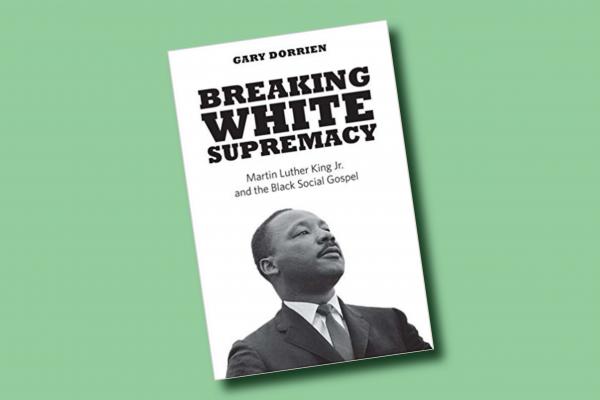THE BLACK SOCIAL gospel is a critically important religious tradition—one that Gary Dorrien gives exquisite treatment in Breaking White Supremacy: Martin Luther King Jr. and the Black Social Gospel. This is the second installment of a two-volume series. The first, The New Abolition: W.E.B. Du Bois and the Black Social Gospel, won the prestigious Grawemeyer Award in Religion. The black social gospel, Dorrien explains, focuses not only on a political economy of justice—on matters including labor, land, and democratic use and ownership of capital—but also, unlike white social gospels, on racial equity.
Breaking White Supremacy explains the family tree of transformative religion that birthed Martin Luther King Jr.’s unique, but not unprecedented, practice of Christianity in Jim Crow America. Dorrien contends that mystic and author Howard Thurman, Morehouse College president Benjamin Mays, and Howard University president Mordecai Johnson provided examples of black Christian piety for King, which along with liberal theological education at seminaries in the northern region of the country shaped King to push America to become the social democracy it has never been.
Breaking White Supremacy walks a fine line that all worthwhile additions to the King literature must walk: celebrating a world-historical figure while also humanizing him; contextualizing the movement that produced him while also noting how his singular presence catalyzed that movement. As an example, and in contrast to flat accounts of King’s nonviolent practice, Dorrien convincingly argues that King did not come to the Montgomery bus boycott with a fully formed theology or theory of peacemaking. Instead, Dorrien’s account suggests that King was a bit of a bookish pastor with strongly felt but largely unpracticed ideas of how to fuse Gandhian nonviolence into a social gospel ministry at the congregational level—much less the level of a citywide mass movement.
Of special note, Dorrien commits a section of the text to the weighty legacy of Rev. Pauli Murray, the first black woman to ascend to the office of priest in the Episcopal Church and one of the co-founders of the National Organization for Women. Murray’s story, too often unheralded, exemplifies a life of poetry, ministry, and lawyering for women’s rights, civil rights, and the full voice of marginalized groups within the common life of national and global society.
Dorrien’s text poses an inescapable question to the reader: Who and where are exemplars of the black social gospel today? The briefest of surveys reveals a constellation of individuals, institutions, and networks committed to this work. Most prominently, the Moral Mondays movement and the Poor People’s Campaign —initiated by Rev. William Barber II, Rev. Liz Theoharis, Yara Allen, and many others—carry the banner with urgency and explicit self-consciousness in this tradition. Opal Tometi’s explicitly liberationist Christian faith, practiced through her co-founding of the Black Lives Matter movement, incarnates a black social gospel. We might also note the activist piety of Bree Newsome who, as she snatched down the Confederate flag flying on the grounds of the South Carolina State House, shouted to security guards ordering her to come down, “You come against me with hatred and oppression and violence. I come against you in the name of God. This flag comes down today!”
In a thousand places and myriad forms, the black social gospel of good news among the poor and among those racialized by white heteropatriarchy is blossoming. At 500 pages, Breaking White Supremacy is a patient, simmering delight to read, an invitation to sow beloved community in an age of racialized capitalism.

Got something to say about what you're reading? We value your feedback!

